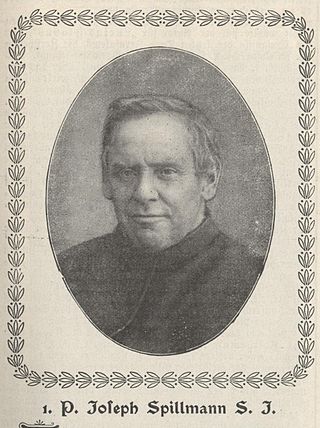This article needs additional citations for verification .(May 2014) |
Peter Roh (born at Conthey (Gunthis) in the canton of Valais, Switzerland, 14 August 1811; d. at Bonn, Germany, 17 May 1872) was a Swiss Jesuit preacher.
This article needs additional citations for verification .(May 2014) |
Peter Roh (born at Conthey (Gunthis) in the canton of Valais, Switzerland, 14 August 1811; d. at Bonn, Germany, 17 May 1872) was a Swiss Jesuit preacher.
Up to his thirteenth year, Roh spoke only French, so that he had to learn German from a German priest in the vicinity before he was able to begin his gymnasial studies in the boarding-school kept by the Jesuits at Brig in Switzerland. He later became a day-pupil at the gymnasium kept by the Jesuits at Sitten. While there, he resolved to enter the Society of Jesus (1829); strange to say the external means of bringing him to this decision was the reading of Pascal's pamphlet Monita Secreta.
He taught the lower gymnasial classes at the lyceum at Fribourg. He was the first (1842-45) professor of dogmatics at Fribourg, then at the academy at Lucerne, which had just been given to the Jesuits. At the same time, Roh preached and aided as opportunity occurred in missions. These labors were interrupted by the breaking out of the Swiss Sonderbund war, during which he was military chaplain; but after its end he was obliged to flee into Piedmont, from there to Linz and to Gries. Finally, he found a safe refuge at Ribeauvillé in Alsace as tutor in the family of his countryman and friend Siegwart-Müller, also expatriated. He stayed there until 1849.
Roh's professorship of dogmatics at the Catholic University of Leuven only lasted a year. When the Catholic missions for the common people were opened in Germany in 1850, his real labors began; as he said himself, "Praise God, I now come into my element."
He was an extemporaneous speaker; the writing of sermons and addresses was, as he himself confessed, "simply impossible" to him.
He could also write when necessary, as several articles from him in the "Stimmen aus Maria-Laach" prove. In his pamphlet "Das alte Lied: der Zweck heiligt die Mittel, im Texte verbessert und auf neue Melodie gesetzt", he declared he would give a thousand florins to the person who could show to the faculty of law of Bonn or Heidelberg a book written by a Jesuit which taught the principle that the end justifies the means. The prize went unclaimed. [1]
Some of his sermons have also been preserved; they were printed against his will from stenographic notes. Father Roh's greatest strength lay in his power of speech and "he was the most powerful and effective preacher of the German tongue that the Jesuits have had in this century".

Peter Canisius was a Dutch Jesuit Catholic priest. He became known for his strong support for the Catholic faith during the Protestant Reformation in Germany, Austria, Bohemia, Moravia, Switzerland and the British Isles. The restoration of the Catholic Church in Germany after the Protestant Reformation is largely attributed to the work there of the Society of Jesus, which he led. He is venerated in the Catholic Church as a saint and as a Doctor of the Church.

Anton Maria Anderledy was a Swiss Jesuit, elected the twenty-third Superior General of the Society of Jesus.

Franz Xavier Wernz SJ was the twenty-fifth Superior General of the Society of Jesus. He was born in Rottweil, Württemberg.

Maria Laach Abbey is a Benedictine abbey situated on the southwestern shore of the Laacher See, near Andernach, in the Eifel region of the Rhineland-Palatinate in Germany. It is a member of the Beuronese Congregation within the Benedictine Confederation. The abbey was built in the 11th-12th centuries and was originally known as "Abtei Laach" until 1862 when the Jesuits added the name "Maria".

Peter Jan Beckx born in Zichem (Belgium) and died in Rome, was a Belgian Jesuit priest, elected the twenty-second Superior-General of the Society of Jesus in 1853.
Karl Josef Rudolph Cornely, was a German Jesuit biblical scholar.
Tilman Pesch, was a German Jesuit philosopher.

Franz Ehrle, S.J., was a German Jesuit priest and a cardinal of the Roman Catholic Church. He served as the Archivist of the Secret Archives of the Vatican, in the course of which he became a leading agent in the revival of Thomism in the teachings of the Catholic Church.
Joseph Epping was a German Jesuit astronomer and Assyriologist.
Theodor Granderath was a German Jesuit scholar.
Alexander Baumgartner was a poet and writer on the history of literature. He was nominated for the Nobel Prize in Literature three times.
William Kreiten was a literary critic and poet.
Gerhard Schneemann was a German Jesuit.

Joseph Spillmann was a Swiss Jesuit children's author.
Georg Michael Pachtler was a German Jesuit controversial and educational writer.
Wilhelm Wilmers was a German Jesuit professor of philosophy and theology.
Stimmen der Zeit is a monthly German magazine published since 1865 by Herder publishers. Its subtitle is Zeitschrift für christliche Kultur, and it publishes articles on Christian culture in the broad sense of the word. It is considered one of the most authoritative German journals in its field.

Clemens Blume was a Jesuit hymnologist.

Joseph Fischer, S.J. was a German clergyman and cartographer. Fischer had an eminently successful career as a cartographer, publishing old maps. In 1901, while he was investigating the Vikings' discovery of America, he accidentally discovered the long-lost map of Martin Waldseemüller, dated 1507. This map, which claims to update Ptolemy with the voyages of Amerigo Vespucci, is the first known to display the word America. The map was purchased from its owner by the United States Library of Congress in 2001 for ten million dollars.
Joseph von Lamezan was a leading German Jesuit preacher. Some of his sermons were published.